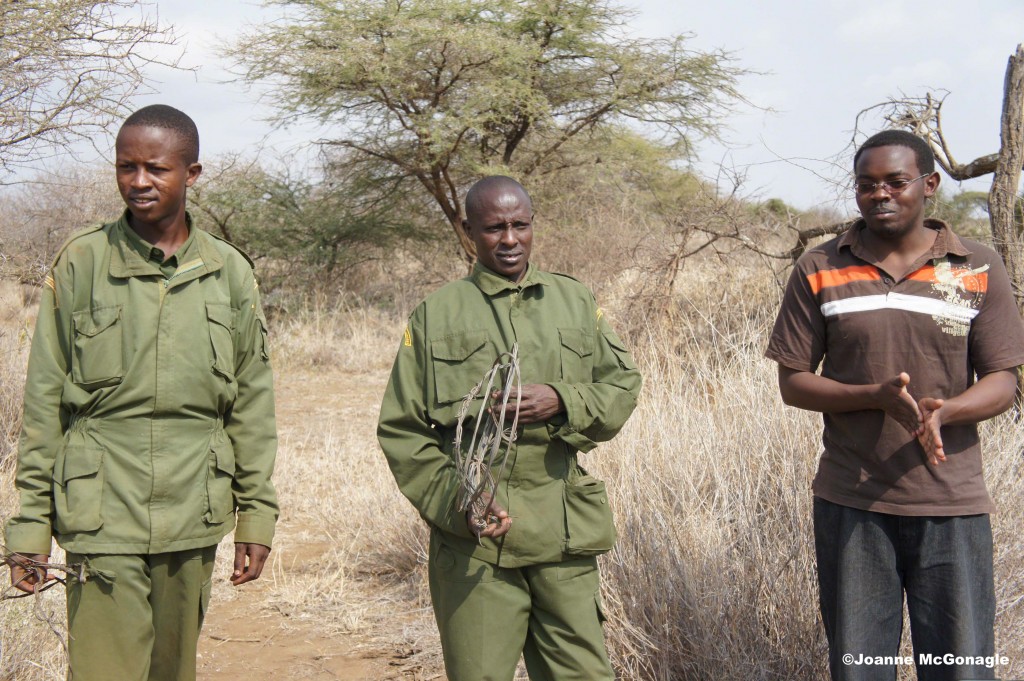
World Wildlife Ranger Day
They work in some of the world’s most dangerous and extreme places. The anti-poaching wildlife rangers do one of the toughest jobs in the world.
The brave women and men work in hostile conditions to protect wildlife. Tirelessly working around the clock, they are the frontline protectors for vulnerable endangered animals. Their work is never done and there is never a break from the ongoing threats to the animals they protect.
Many wildlife rangers have died in the line of duty. Fighting to protect wildlife, they are murdered by poachers or killed by distressed animals. Current global statistics state that two rangers lose their lives every week in the line of duty.
Wildlife Ranger Duties
The duties of wildlife ranger is vital to the survival of critically endangered species like elephants, rhinos, and tigers. Without the rangers, there would be no hope to win the war on wildlife crime.
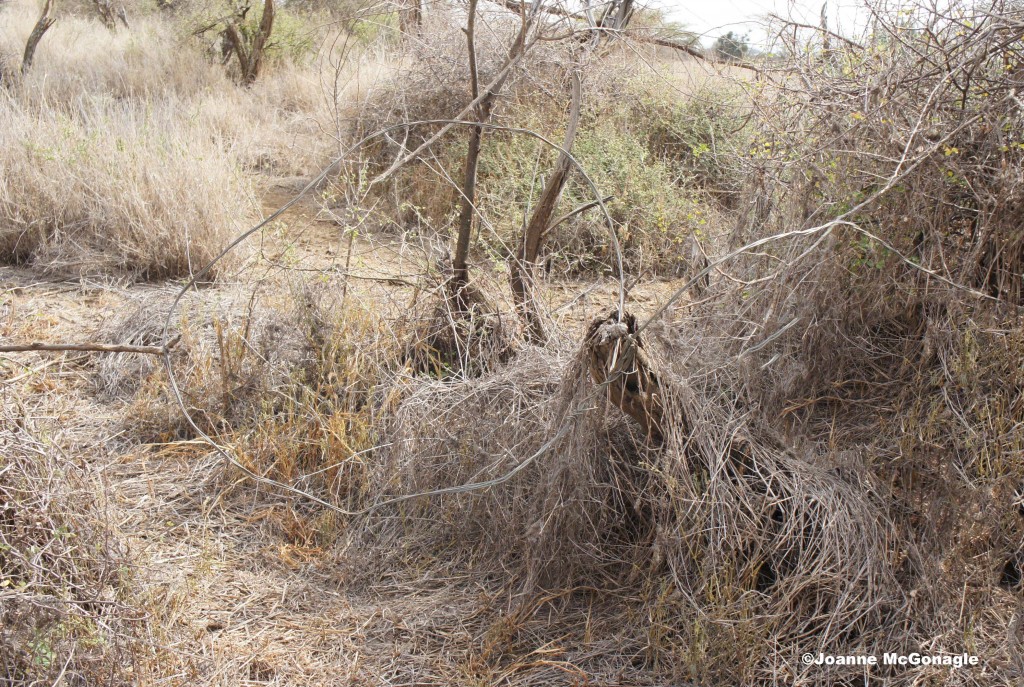
Wildlife Ranger Duties include:
- Locate and remove snares
- Collect vital data on endangered species and habitats
- Respond to reports of wildlife crime and gather intelligence.
- Ongoing anti-poaching patrols
Searching for snares with the African Conservation Center Scouts
I had the opportunity during my zoology studies to spend a day with the African Conservation Center Scouts. After reading about the ACC Scouts and trying to imagine what a typical day must be like for them, the experience of walking along side them felt surreal. Yet there I was boots on the ground ready to search. After a brief introduction and a reminder to remain vigilant in the open bush we began to survey the area.
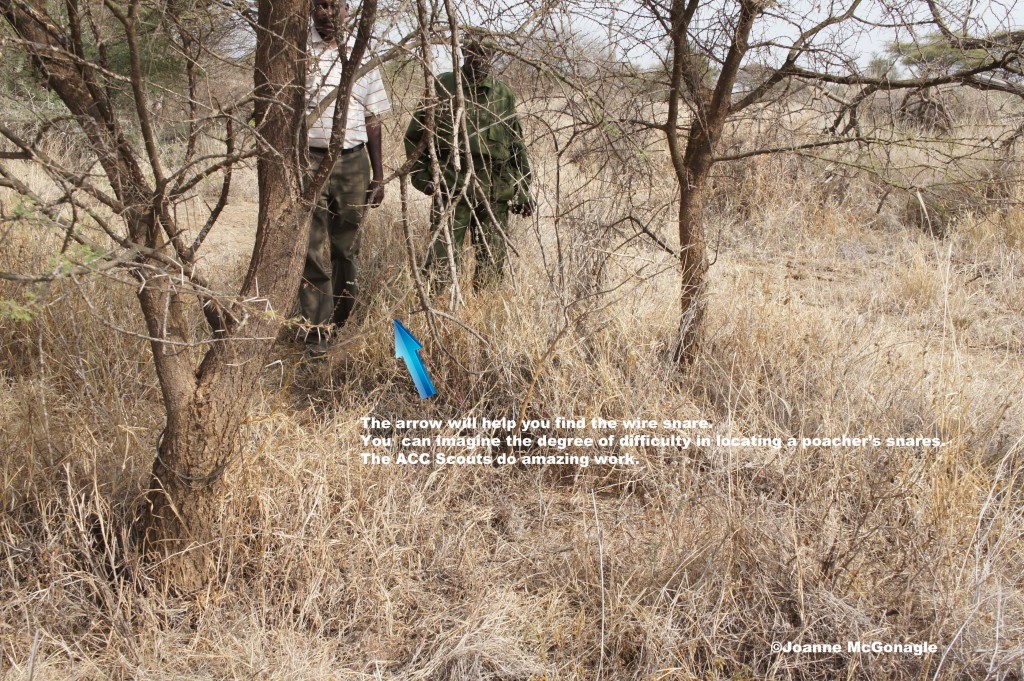
An untrained eye could easily walk right past the wire snares that are nearly invisible even from short range. The poachers are equipped with GPS units helping them locate and return to active snares they placed in the expansive open savannah between Kenya and Tanzania. The ACC Scouts also track poacher activity on their GPS units trying to keep tabs on active locations. The Scouts used to be able to track the footprints of the poachers until the poachers began to wear the same shoes as the Kenya Wildlife Service and the ACC Scouts. Now the Scouts keep exacting records of the time and location of their searches so that a misplaced footprint can be identified.
The Scouts must rely on their finely honed observation skills tracking down poacher activity and dismantling snares before an animal is caught. Animals caught in a poacher’s snare may die quickly but often the snared animal dies a long and painful death from infection or starvation.
We dismantled both snares we found on our search. I couldn’t help but think how overwhelming the search for snares must be for the ACC Scouts. Such a big problem over such a big space. But they are determined to save lives by dismantling one snare at a time.
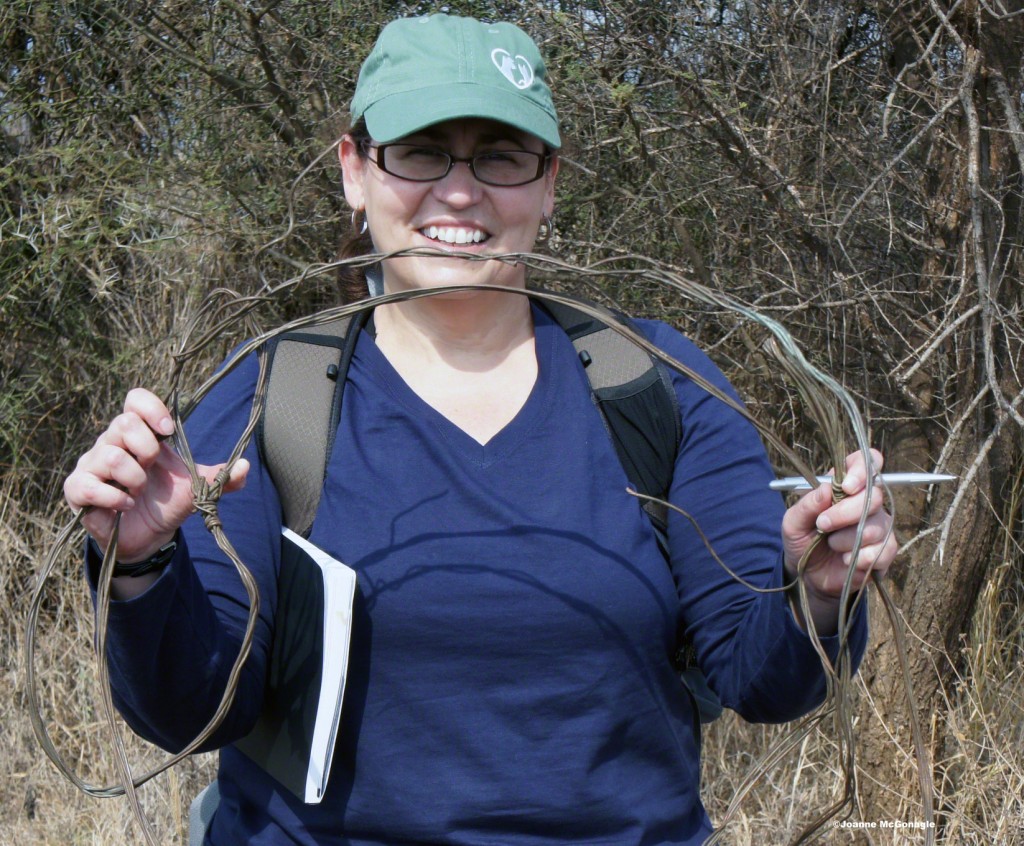
The Scouts were kind enough to take a photo of me holding one of the snares we found that day.
True Wildlife Heroes
It was an honor to walk with the African Conservation Center Scouts and to see up close the work that they do every day to help all animals. They are true wildlife heroes.
Thanks to your support of Triple T Studios, the Tiniest Tiger Community has made a donation to the Wildlife Rangers through David Shepherd Wildlife Foundation
World Ranger Day: Honoring the Guardians of Our Natural Heritage
World Ranger Day is observed annually on July 31st, paying tribute to park rangers across the globe. These guardians of the natural world play a critical role in the conservation of protected areas, operating as stewards of biodiversity and cultural history. Their work involves safeguarding wildlife, maintaining ecosystems, and ensuring the long-term preservation of parks and wildlife reserves. Yet, despite their integral role in environmental protection, rangers often face numerous challenges that include poaching, loss of habitat, and limited resources.
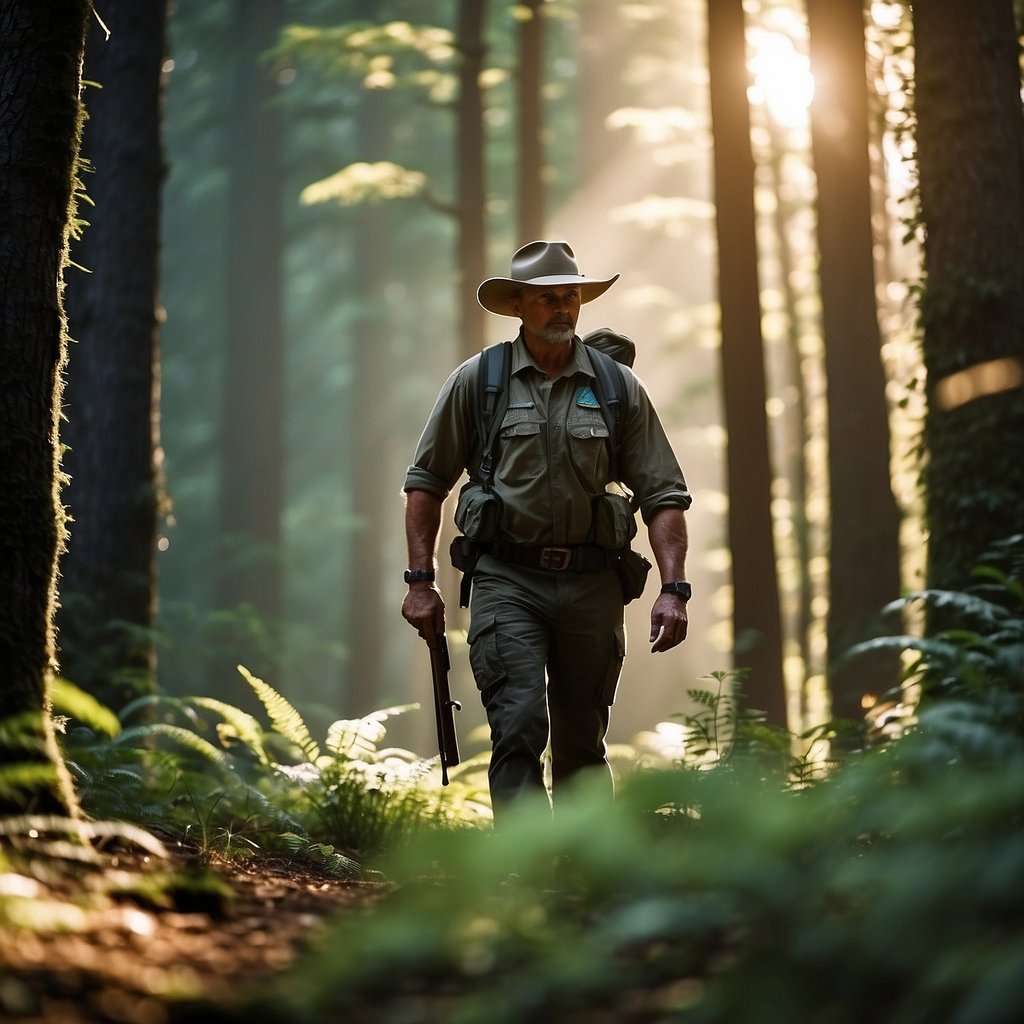
The commemoration of World Ranger Day is not only about celebration but also remembrance. It honors those rangers who have lost their lives or been injured in the line of duty. Recognized globally, the day brings attention to the ongoing dedication and sacrifices made by these individuals. By spotlighting the importance of their work and the complex issues they contend with, World Ranger Day strives to garner support and raise awareness about the need for more resources and better safety measures for rangers.
Key Takeaways
- World Ranger Day highlights the dedication and sacrifice of park rangers worldwide.
- The day serves as a reminder of the critical conservation work rangers perform and the challenges they face.
- It is a call to action for increased recognition, resources, and support for rangers’ safety and their vital role in environmental protection.
History of World Ranger Day
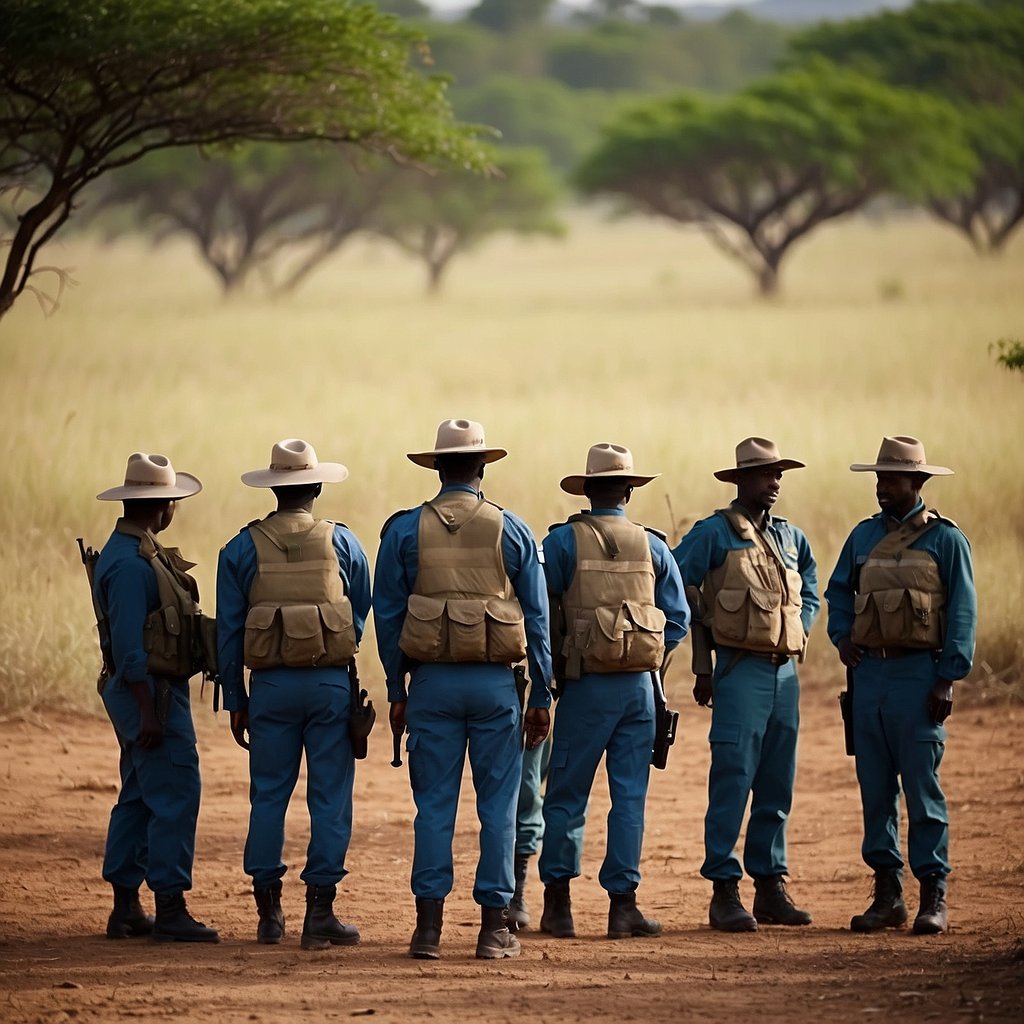
World Ranger Day, commemorated annually on July 31st, honors rangers who have lost their lives in service and celebrates the dedication of those protecting natural and cultural treasures around the globe.
Establishment and Significance
Established by the International Ranger Federation (IRF) in conjunction with the 15th anniversary of the organization’s inception in 1992, World Ranger Day was first observed in 2007. It serves both to commemorate park rangers worldwide and to honor the memory of those who have died or been injured in the line of duty.
Global Recognition and Support
Since its inception, support and recognition for World Ranger Day have grown internationally. Conservationist Sean Willmore, also a park ranger, bolstered awareness through his documentary efforts, highlighting the challenges and risks faced by rangers. This global observance now serves as a call to action, encouraging support and acknowledgment of park rangers’ critical role in protecting natural resources.
Purpose of World Ranger Day
World Ranger Day serves to remember rangers who have lost their lives or been injured while on duty and to recognize the critical role they play in conserving natural and cultural treasures.
Conservation Awareness
World Ranger Day underscores the significant efforts rangers make to protect wildlife and ecosystems. They are instrumental in enforcing laws to prevent poaching and illegal trading. The day serves as a reminder of the environmental challenges rangers confront and highlights the importance of preserving natural habitats.
Ranger Welfare Advocacy
The welfare of rangers is a primary focus of World Ranger Day. The day draws attention to the need for adequate training, resources, and support for rangers, who often work under challenging and dangerous conditions. It also acknowledges the sacrifices made by rangers and their families, emphasizing the necessity for improving their safety and well-being.
Community Engagement
On World Ranger Day, communities are encouraged to learn about the vital work of rangers and the impact of their actions on conservation and local economies. This day advocates for active community participation in supporting conservation initiatives. It is an opportunity to foster a deeper understanding and respect for the work rangers do and to promote wider involvement in conservation efforts.
Challenges Faced by Rangers
Rangers operate under demanding circumstances to guard natural resources. They confront a variety of obstacles, from on-duty hazards to changing environmental conditions.
Dangers in Duty
Rangers regularly encounter life-threatening situations. According to the International Ranger Federation, in the period 2020-2021, 120 rangers died in the line of duty due to various causes, including:
- Homicides: Often stemming from confrontations with poachers or illegal loggers.
- Wildlife Attacks: Dangerous encounters with the species they protect can be fatal.
- Accidents: Vehicular mishaps can occur, especially in remote and rough terrains.
Resource Limitations
- Equipment: Many rangers lack access to modern technology and basic equipment necessary for effective patrolling.
- Funding: Conservation efforts are frequently underfunded, compromising operations.
- Training: Insufficient training can leave rangers inadequately prepared to deal with the diverse challenges they face.
Climate Change Impacts
- Environmental Stress: Rangers are often the first to respond to the consequences of extreme weather events affecting wildlife and habitats.
- Shifts in Biodiversity: Changes in species distributions may require rangers to operate in new, unfamiliar areas.
- Resource Conflicts: Scarcity of natural resources can lead to increased tension and conflicts, putting additional pressure on rangers.
Frequently Asked Questions
In this section, readers will find concise answers to common queries surrounding World Ranger Day, offering a deeper understanding of the event and its importance.
What activities are typically organized to commemorate World Ranger Day?
Events on World Ranger Day range from honoring fallen rangers to educational workshops. Many organizations host community clean-ups, wildlife conservation projects, and ceremonies to raise awareness of the critical role rangers play in protecting natural and cultural heritage.
How is World Ranger Day significant to the International Ranger Federation?
For the International Ranger Federation, World Ranger Day is a cornerstone event that highlights the dedication of rangers globally. It’s a day to recognize their valor, to commemorate the lives lost, and to promote the support and funding needed to enhance their essential work.
In what ways can individuals and communities participate in World Ranger Day?
People can engage with World Ranger Day by participating in local events, donating to ranger support causes, and spreading awareness through social media. Communities often organize fundraisers, photo exhibitions showcasing rangers’ work, and conservation education sessions.
What was the designated theme for World Ranger Day in the previous year?
The designated theme for the previous World Ranger Day focused on the challenges rangers face and their role in safeguarding biodiversity. Specific themes vary year to year, addressing current conservation issues and promoting solidarity within the ranger community.
How do rangers contribute to conservation efforts in Africa?
Rangers in Africa are on the frontline of conservation, battling poaching, habitat loss, and illegal wildlife trade. They undertake patrols, engage in anti-poaching operations, and work closely with local communities to sustainably manage and protect wildlife and ecosystems.
When is the World Ranger Congress scheduled to take place and what are its objectives?
The World Ranger Congress is organized every three years by the International Ranger Federation. Its objectives include fostering global collaboration between rangers, sharing best practices in conservation, and discussing innovative strategies to tackle the ever-evolving challenges rangers face worldwide.